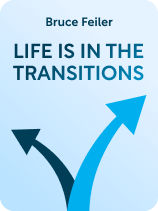

This article is an excerpt from the Shortform book guide to "Life Is in the Transitions" by Bruce Feiler. Shortform has the world's best summaries and analyses of books you should be reading.
Like this article? Sign up for a free trial here.
What are the benefits of talking about experiences? How should you handle it if you receive negative feedback?
While it can be difficult to open up about personal experiences, Bruce Feiler argues that there are five major benefits to doing so. By becoming vulnerable, you can overcome loneliness, receive support, get feedback, and more.
Here’s why you should open up about your experiences, as described in the book Life Is in the Transitions.
Talk About It
In his book, Feiler explains that sharing your transformation with others can make enduring the transformation easier. Talking about experiences cuts through loneliness—which many people experience when their lives are in a state of upheaval—and has even been shown to improve physical health outcomes.
(Shortform note: Despite the mental and physical benefits of opening up, many people struggle to talk about their experiences because they’re afraid of being vulnerable. If that applies to you, Brené Brown offers several tips for embracing vulnerability in Daring Greatly. For example, she recommends letting go of perfectionism and realizing that you’re never alone in your journey—no matter what you’ve been through, someone else has been through it, too. This perspective can embolden you to seek out support from others who are likely to understand and accept you and your experiences.)
Feiler describes five ways that talking about what you’re going through with others can help you:
You might receive support. Feiler explains that when you share about your life, you give others a chance to understand, comfort, and validate you, which can make the burden you’re carrying feel easier to bear. (Shortform note: If you’re worried that you won’t receive support when you share your story, it’s OK to be discerning about who you choose to share with. It’s also OK to take your time opening up—you don’t have to share your entire story all at once if you’re not comfortable doing so. Research shows that sharing a little bit about yourself at a time can help you build intimacy with another person, and as intimacy grows, you’ll likely get more comfortable revealing some of the darker or more difficult aspects of your journey.)
You might feel encouraged. According to Feiler, letting others know what you’re dealing with opens the door to advice and points of view that can keep you moving forward. For example, talking with friends about your career options could help you clarify your goals and create an action plan. (Shortform note: Experts define encouragement as a mixture of praise and constructive feedback that boosts your confidence and makes you feel more optimistic. Coupling encouragement with accountability—being answerable to someone for your actions or progress—can be especially helpful. For example, if your friends encourage you to work on your resume and check in with you about it later, you might feel more motivated to make progress.)
You might get a reality check. During a transition, you may be prone to unrealistic or unhelpful thought patterns. Feiler says sharing your thoughts with others allows you to hear outside perspectives that help you see things more clearly. (Shortform note: Some people feel threatened or discouraged by reality checks. According to Douglas Stone and Sheila Heen in Thanks for the Feedback, this is because disagreement can be triggering—you perceive it as a threat to your beliefs, your relationship with the person giving you feedback, or your identity. Nevertheless, the reality check might be something you need to hear in order to grow. To stay open to such feedback, Stone and Heen recommend understanding and learning to cope with your triggers.)
You might be inspired. If you open up about what you’re going through, you could learn that someone else has been through something similar and emerged stronger. According to Feiler, hearing their stories can offer you hope and can motivate you to persevere. (Shortform note: This type of inspiration can be especially valuable for trauma survivors. For instance, in Unbound, Tarana Burke describes how learning that poet Maya Angelou had survived sexual abuse helped her cope with her own sexual abuse. Burke also explains that this inspired her to found the “me too” movement, which works by teaching survivors that they’re not alone in their experiences and that healing is possible.)
You might get negative feedback. Feiler acknowledges that not everyone you’re vulnerable with will be sympathetic to your struggles, hopes, and fears. However, if someone reacts poorly to your story, you can still grow from that experience: The desire to prove them wrong or address their criticism can motivate you to work harder, find meaning in your transformation, and create a life worth living. (Shortform note: Psychologists use reactance theory to explain this type of motivation. According to reactance theory, you might interpret others’ disapproval of your actions as a threat to your autonomy—and this may compel you to take back your power by doing exactly the opposite of what they expect from you.)

———End of Preview———
Like what you just read? Read the rest of the world's best book summary and analysis of Bruce Feiler's "Life Is in the Transitions" at Shortform.
Here's what you'll find in our full Life Is in the Transitions summary:
- How to deal with curveballs and obstacles in life
- The pattern that most of life’s disruptions follow
- How to rewrite your life story in a positive way






